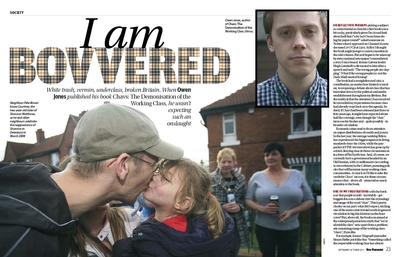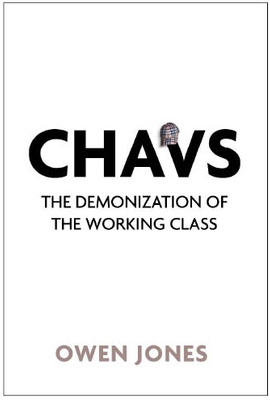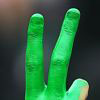 On reflection perhaps picking a subject as controversial as class for a first book was a bit cocky, particularly given I’m 26 and look about half that (“why isn’t Owen Jones doing his paper-round?” asked someone on Twitter when I appeared on Channel 4’s now deceased 10 O’Clock Live). At first I thought the book might just get a cursory mention in the odd column. But as it began to be taken up by every national newspaper I remembered a story I once heard: former Labour leader Hugh Gaitskell’s wife turned to him after a speech and said: “The wrong people are clapping.” What if the wrong people (i.e. not the Daily Mail) started booing?
On reflection perhaps picking a subject as controversial as class for a first book was a bit cocky, particularly given I’m 26 and look about half that (“why isn’t Owen Jones doing his paper-round?” asked someone on Twitter when I appeared on Channel 4’s now deceased 10 O’Clock Live). At first I thought the book might just get a cursory mention in the odd column. But as it began to be taken up by every national newspaper I remembered a story I once heard: former Labour leader Hugh Gaitskell’s wife turned to him after a speech and said: “The wrong people are clapping.” What if the wrong people (i.e. not the Daily Mail) started booing?
The book had a straightforward aim: a contribution, no matter how limited or modest, to reopening a debate about class that has been shut down by the political and media establishment throughout my lifetime. But the reality is that the attention Chavs received far exceeded my expectations because class had already crept back on to the agenda. Indeed, if Chavs had been released just three or four years ago, it might have expected about half the coverage, even though the “chav” term was far fresher and – quite possibly – in broader circulation.
Economic crises tend to focus attention on unjust distributions of wealth and power. In the last year, the average working Briton has experienced the biggest squeeze in living standards since the 1920s, while the pay-packet of FTSE 100 executives has gone up by a third: denying class in those circumstances is a form of Flat Earth-ism. And, of course, we currently have a government headed by an Old Etonian, with 22 millionaires (according to one estimate) in the Cabinet, pursuing policies that will hammer many working-class communities. As much as I’d like to take the credit for Chavs’ success, it is these circumstances that – above all – attracted so much attention to the book.
One of my frustrations with the book was that people would – inevitably – get bogged down in a debate over the etymology and usage of the word “chav”. This is pretty cheeky on my part: what did I expect, sticking one of the most controversial words in general circulation in big black letters on the front cover? But, above all, the book was aimed at the widespread pernicious myth that “we’re all middle-class” now apart from a problematic remaining rump of the working class: “chavs”, if you like.
For example, former Telegraph journalist Simon Heffer put it like this: “Something called the respectable working class has almost died out. What sociologists used to call the working class does not usually work at all, but is sustained by the welfare state.” Now, Heffer would never dream of using the word “chav” – I know that for a fact – but this is an eloquent example of the mainstream thesis that “we’re all middle-class – apart from the ‘chavs’”. For the right, it was the idea of everyone being middle-class apart from an “underclass”. For New Labour, it was the so-called “socially excluded” who – it was felt – had a role in their own exclusion.
It’s the idea of the old working class collapsing into a morally debauched, feckless rump that the first chapter explored through the case of Shannon Matthews. A little girl had gone missing but, because she was from a poor, working-class family, journalists struggled to empathise and there was far less coverage than of Madeline McCann’s disappearance. It was a story about how intense social divisions in human society prevent us from even relating to each other.
When it was discovered that her mother, Karen Matthews, had abducted her to extort money from the tabloid press, open season was declared – not just on her, but against everyone perceived to share her background. The community that had rallied together to find Shannon were compared to the estate on Channel 4’s Shameless. The Conservatives used the case to argue it was the tip of an iceberg; and one journalist in the Independent argued: “What was once a working class is now, in some places, an underclass. It is a decline that this unfortunate woman seems to embody.”
Above all, the driving force behind the book was to argue that the real working class had effectively been airbrushed out of existence. Yes, it had changed shape: people were more likely to work in shops, call centres and offices than mines, docks or factories. And yes, the legacy of rapid deindustrialisation has left many communities without secure, skilled, well-paid jobs for a good deal of their inhabitants. But the idea that one part of the working class had shifted into the middle class, while the other had disintegrated into a chaotic rump, was a myth that needed exposing.
All this isn’t to bypass how “chav” is used as a word. Many of the radio debates I took part in focused on this side of the story, and I think it was right to highlight its use as a term of class hatred: so-called “backronyms” invented like “Council Housed Associated Vermin”; books such as The Little Book of Chavs which attack people who live on council estates, supermarket workers and even children on free school meals; and websites such as “ChavTowns” which demonise entire communities (such as my own beloved Stockport).
As it turned out, my initial dread about how the book might be received was largely first-time author nerves: the arguments got a fair hearing and I was chuffed with reviews in papers like the Independent, The Times and (most surreal of all) the New York Times. Some of my comrades on the socialist left – from where I hail politically – got a bit suspicious. “Don’t you think it’s a bit odd that the mainstream press are being so nice about it?” one asked me. I didn’t help myself when, as well as cobbling together pieces for newspapers like the Independent, I agreed to write an article plugging the book in the Sun (before its sister paper was found to have hacked into the phones of dead children and terror victims, I should add). That took a bit of soul-searching, but I felt it was a way of pushing my arguments to a mass readership of predominantly working-class people.
 In any case, some critics gave me a good old kicking. Rod Liddle described Chavs in the Sunday Times as “the bastard offspring of Private Eye’s Dave Spart and Sue Townsend’s Adrian Mole”. I have to admit I laughed at that. I savagely attacked Liddle in the book for chav-bashing Jade Goody and mocking her terminal illness (“A stroke would have made for more dramatic television, but cancer, you have to say, has a certain cachet.”) So, in this case, a hatchet job was more welcome than an endorsement.
In any case, some critics gave me a good old kicking. Rod Liddle described Chavs in the Sunday Times as “the bastard offspring of Private Eye’s Dave Spart and Sue Townsend’s Adrian Mole”. I have to admit I laughed at that. I savagely attacked Liddle in the book for chav-bashing Jade Goody and mocking her terminal illness (“A stroke would have made for more dramatic television, but cancer, you have to say, has a certain cachet.”) So, in this case, a hatchet job was more welcome than an endorsement.
Spiked – a curious bunch of ex-Trotskyist-mavericks-turned-libertarian-contrarians – weren’t fans, either. The editor, Brendan O’Neill, effectively accused me of being a Labour stooge (news to Jon Cruddas, I’m sure, whose big criticism of the book was that “there appears to be no redeeming element to 13 years of Labour rule”). I was accused of taking a pitying stance, even though the book was an argument in favour of working-class power and representation. And, equally confusingly, I was accused of wanting working-class people to know their place, suggesting to me that O’Neill had overlooked the chapter entitled “A Rigged Society”, about how entire professions had locked working-class people out.
But there were plenty of fair criticisms: like a critically supportive piece by the superb Lynsey Hanley, one of the few working-class journalists around. She felt Chavs had some over-simplifications, and apologised too much for bigotry when seeking to explain the BNP’s growth in certain working-class communities.
The debate was always more important than the book. Don’t tell my publishers, but I was never desperately hung up on people buying Chavs as long as the issues were debated, even if that meant strongly disagreeing with some of my arguments. The most exciting parts have been people debating class in newspapers, on Twitter, on blogs and in everyday conversations. The discussions and sharing of experiences at each Chavs public meeting have been inspiring and educational.
As well as the specific arguments, though, I had a broader point. I wanted to question the utter absurdity and irrationality of human society being acutely divided by wealth and power. Long after Chavs stops being debated, I hope others keep questioning it too.
Chavs: The Demonisation of the Working Class is published by Verso

